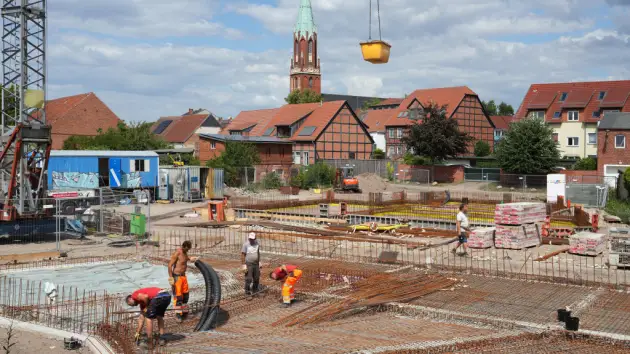Olaf Scholz of Germany once set a goal to build 400,000 new homes annually even before he was appointed chancellor.
Two years later, German housebuilding appears to be in collapse, placing pressure on the nation’s economy as a whole as well as his elusive goal.
According to a report released last week by the Ifo Institute for Economic Research, companies are abandoning residential construction projects, order numbers are declining, and the industry’s future looks bleak.
In October, a new record high of over 22% of the surveyed companies reported canceling residential construction projects in Germany. In the meantime, 48.7% of respondents reported a deficiency in orders, up from 46.6% in the prior month and 18.7% a year earlier.
The Ifo called the state of expectations for the residential construction sector a “exceptional low.” And observers aren’t just getting nervous about this set of data.
The Hamburg Commercial Bank’s most recent construction PMI survey for Germany dropped to 38.3, the lowest level in three and a half years. This was a decrease from September as well.
The state of the German construction industry is getting worse. According to a press release from Hamburg Commercial Bank’s chief economist Cyrus de la Rubia, “the housing sector is the epicenter of the downturn, nosediving at a breakneck speed.”
Data on building permits also presents a mixed picture in other places. According to the German Federal Statistical Office, there were 28.3% fewer building permits issued between January and August of this year than there were during the same period in 2022.
According to the data, just 175,500 permits were issued in the first eight months of this year, meaning that the government is likely to fall short of its target of building 400,000 new homes. Carsten Brzeski, global head of macro research and chief economist for Germany at ING, told that fewer than 250,000 are probably going to be built this year.
“The initial casualty of elevated interest rates”
According to Brzeski, one of the main causes of the sector’s declining trend has been rising interest rates.
“The construction and homebuilding industry is the first casualty of rising interest rates,” he declared, citing rising energy and material prices along with total financing costs as the main causes of the collapse.
The European Central Bank has been raising interest rates in an effort to reduce inflationary pressures, much like many other central banks around the globe. At its meeting last month, the ECB held rates steady at 4% after ten straight increases.
In addition to increased rates and materials, Klaus Wohlrabe, head of Ifo surveys, stated that pressure has also increased due to reductions in housing construction subsidies.
He told, “Building a house becomes impossible for many private consumers when all three points are taken into account.”
“Bad news” regarding the economy
And the experts say that this is just the beginning of the situation.
“Next year, when all order books are empty, developers are left with high-cost projects, and demand won’t pick up quickly enough, the situation will worsen,” Brzeski said.
Wohlrabe concurs that more challenges might arise in 2024.
At the moment, a lot of businesses rely on their order backlog. However, there is a growing disparity between the amount of construction that is being produced now and the amount of orders that are coming in. This increases the likelihood of a decline in 2024,” he stated.
Furthermore, he noted that since the construction sector accounts for about 7% of Germany’s GDP, a fall in this sector might exert pressure on economic expansion.
This occurs at a time when worries about Germany’s economy have been growing all year long since it entered a technical recession in the first quarter of 2023. According to the European Commission’s most recent estimate, Germany’s economic activity will likely contract this year before rising once more in 2024—albeit at a slower rate than initially predicted.
However, problems in the housebuilding industry may also have an effect on the labor market, as Brzeski pointed out.
“It is an obvious indication that the economy, which is currently in a state of stagnation, has the potential to rapidly enter a recession with increasing joblessness,” he stated.
The German federal government unveiled new initiatives last week with the goal of cutting red tape and expediting the planning and permit procedures for construction projects. It also disclosed financial assistance for businesses with high electricity expenses.
However, neither Wohlrabe nor Brzeski see the measures as a clear solution, and the experts are not entirely convinced that they will ease Germany’s current housebuilding crisis.
While Wohlrabe is worried that more long-term problems could arise if important issues like financing costs are not addressed, Brzeski thinks the measures could at least help soften the downturn.
Wohlrabe added that if the crisis drags on for too long, there may be a “dampening effect” overall as a result of the reduced workforce and machinery that would not be present when the industry recovered.





